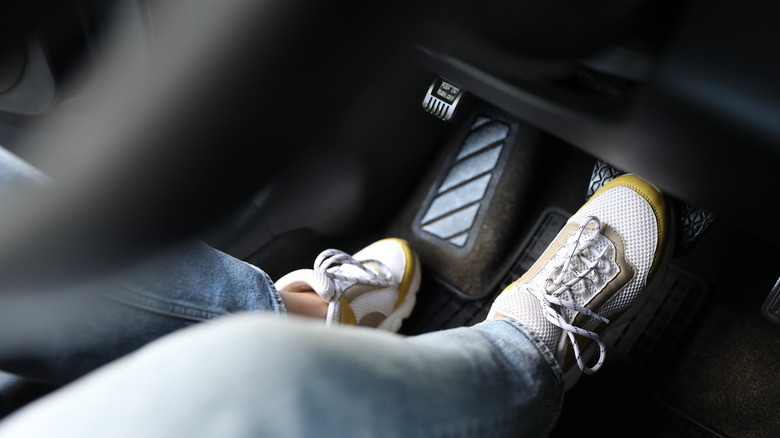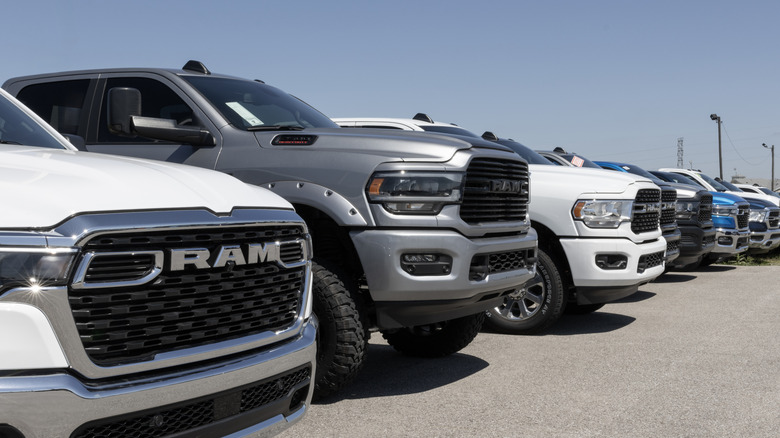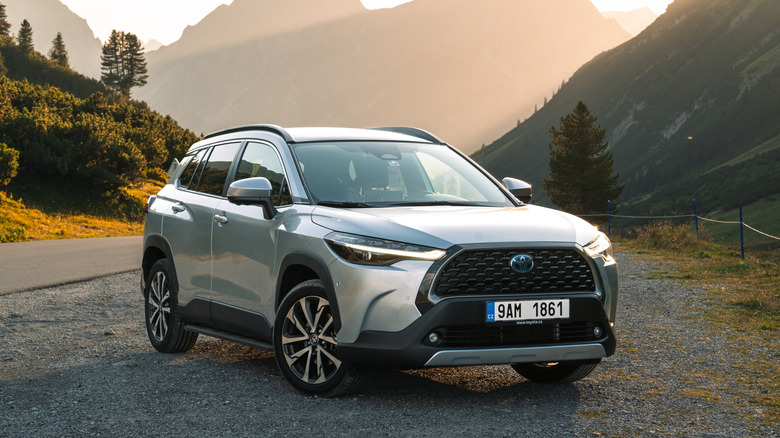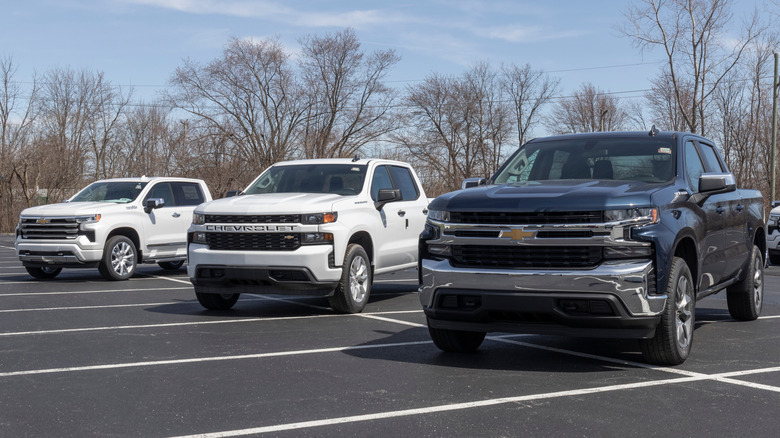The Biggest Brake Recalls In Recent History
When you buy a new car, you expect it to perform reliably. However, hidden issues can arise that may compromise your safety. One important component that often goes unnoticed until something goes wrong with them are the car brakes. A faulty brake can lead to an array of problems, from unusual and alarming squeals to a burning smell from the wheels — and in some cases, complete brake failure. When these risks become apparent, automakers often issue recalls to prevent potential accidents.
Despite advancements in automotive technology and safety features, brake-related recalls still exist. While some recalls only involve minor defects that require quick and easy fixes, others can be more serious and need part replacements. Since manufacturers produce vehicles by batch, certain brake problems may affect hundreds or thousands of cars, and thus require urgent manufacturer action. Even if car owners notice warning signs like an erratic braking response from the vehicle or a warning light on the dashboard, many only become aware of the issue once a recall is announced.
Here's a look at some of the most significant car brake recalls in recent years, the problems that led to them, and how manufacturers addressed these safety concerns. These recalls have affected even the biggest brands in the automotive industry, forcing them to take action to protect consumers.
Stellantis issues double recall in October and December 2024: 340,000 vehicles
Stellantis issued two major recalls in late 2024, affecting an estimated total of 340,000 vehicles due to braking concerns. In December, the company recalled 317,630 Ram heavy-duty pickup trucks from model years 2017-2018 over a faulty hydraulic control unit. It was found that the defect could impact the anti-lock braking system (ABS), electronic stability control (ESC), and traction control. While standard braking remained functional, Stellantis moved quickly to address the issue by offering free repairs to affected customers. No injuries were reported over this defect.
In October 2024, Stellantis also recalled 21,000 SUVs due to a potentially dangerous brake pedal defect. The recall affected 2024-2025 Dodge Hornet and Alfa Romeo Tonale plug-in hybrid vehicles built between July 2023 and July 2024. According to the National Highway Traffic Safety Administration (NHTSA), the issue stemmed from a weak brake pedal assembly that could collapse, leading to a sudden loss of braking function. Twelve incidents of brake pedal failures were reported globally between November 2023 and April 2024, including one that resulted in an accident. However, no injuries were reported.
Unlike some modern recalls that can be resolved through software updates, the mechanical defect required physical repairs at dealerships. The fix involved reinforcing the brake pedal arm with an additional bolt and nut, and Stellantis offered the service for free. The company also issued guidance on emergency stopping procedures alongside the recall, including using the Electronic Park Brake to bring the vehicle to a controlled stop if the brake pedal collapses.
Toyota recalls Corolla Cross Hybrid and Corolla Hybrid in September and November 2024: 145,200 vehicles
In September 2024, Toyota recalled 42,199 Corolla Cross Hybrid vehicles manufactured between June 2022 and September 2024 due to a brake actuator assembly defect. The issue, linked to a software error in the skid-control electronic control unit (ECU), could cause the power brake assist to fail when the vehicle is turning. This malfunction could result in a hard brake pedal and reduced braking force, increasing stopping distances, and potentially raising the risk of accidents.
In a letter released by the NHTSA in the same month, the agency said not all affected Toyota Corolla Cross Hybrid vehicles were sold in the U.S., and the faulty brake actuator assembly was supplied by Bosch. It also indicated that other U.S.-market Toyota and Lexus models do not share the same component design and would not be included in the recall.
However, a follow-up statement by Toyota USA released in November 2024 added 103,000 Corolla Hybrid units sold to the recall. The vehicles manufactured between May 2022 and November 2024 were sold in the U.S. To address the issue, the Japanese automaker offered a fix for the skid-control ECU at no cost. Dealers were notified, and affected Corolla Cross Hybrid owners received recall notices by November 2024. On the other hand, Corolla Hybrid owners would receive theirs by January 2025.
GM recalls Chevrolet, GMC, and Cadillac SUV and Trucks in September 2024: 450,000 vehicles
In September 2024, General Motors (GM) recalled nearly 450,000 trucks and SUVs due to a potential issue with their brake fluid warning system. In a safety recall report, the NHTSA said affected vehicles might fail to alert drivers when brake fluid levels would drop, which could lead to reduced braking performance and increased risk of a crash.
The recall affected the 2023 Chevrolet Silverado 1500 (59,175 units), 2022-2024 Chevrolet Tahoe (134,854 units), 2023-2024 Chevrolet Suburban (65,411 units), 2023-2023 GMC Sierra 1500 (35,989 units), 2023-2024 GMC Yukon (57,083 units), 2023-2024 GMC Yukon XL (44,945), 2023-2024 Cadillac Escalade (33,005 units), and the 2023-2024 Cadillac Escalade ESV (19,209 units). Production dates for the recalled vehicles ranged from August 2022 to July 2024.
The defect stemmed from a mismatch between the electronic brake control module (eBCM) software and its calibration, preventing the system from displaying a timely brake fluid warning. Despite this issue, GM stated that the affected vehicles still met federal stopping-distance requirements. However, if brake fluid levels dropped significantly, braking performance could degrade before the warning light could even be activated. A red brake telltale would eventually illuminate, but not necessarily in time to meet federal safety standards.
To address the issue, GM released a software update for the eBCM to ensure the warning system would function correctly. Owners of vehicles with over-the-air (OTA) update capability received the fix remotely, while those without OTA functionality needed to visit a dealership. Affected car owners received recall notices starting October 28, 2024.
Honda recalls multiple models in June 2023: 124,077 vehicles
In June 2023, Honda issued a recall affecting 124,077 vehicles across five models due to a critical brake issue. The NHTSA report named the 2020-2021 Civic, 2020-2023 Ridgeline, 2021-2023 Passport, 2021-2022 Pilot, and 2020 Acura MDX as the models affected by the issue. The problem started from a tie rod fastener that might have been improperly assembled during manufacturing. The defect could cause the brake master cylinder to separate from the brake booster assembly. This could then result in a loss of braking ability, which would increase the risk of accidental crashes.
In the wake of the recall, Honda assured customers that dealerships would inspect and repair the affected brake booster assemblies free of charge. However, while Honda took the initiative to correct the problem through the recall, questions remained about the adequacy of the fix it extended to owners, and whether the underlying issue was fully resolved.
In September 2023, a class action lawsuit was filed against the Japanese brand, alleging that it failed to properly address the brake defect. The suit claimed the company did not identify the root cause or correct its manufacturing process. Additionally, the replacement tie rods provided under the recall were also allegedly defective, leaving drivers still vulnerable to potential brake failures after the service. Furthermore, the lawsuit contended that Honda knew about the issue before the recall, but did not disclose the safety risk right away.
Ford issues massive recalls in March and July 2023: 2.2 million vehicles
Ford issued the biggest brake recalls in recent history in 2023, covering a total of 2.2 million vehicles. In July, the American automaker recalled 870,701 F-150 trucks from model years 2021-2023 due to an issue wherein the electronic parking brake could engage unexpectedly, even while driving. The issue was found to be caused by a wiring harness that could rub against the rear axle housing, wearing away insulation and potentially leading to unintended brake activation.
An internal investigation identified 299 cases of the parking brake activating unintentionally, including 19 incidents when this happened as the vehicle was in motion. However, no crashes or injuries were reported. Ford extended free repairs to affected units to remedy the problem.
In March, Ford announced another recall for 1,280,726 vehicles, including Ford Fusion and Lincoln MKZ sedans from model years 2013-2018. The recall centered around faulty front brake jounce hoses, which could rupture prematurely and cause brake fluid leaks. A loss of brake fluid could lead to increased pedal travel and reduced deceleration, thus raising crash risks.
According to the NHTSA, Ford estimated that approximately 2% of the recalled vehicles had the defect. It was aware of one crash related to the issue, but reported no injuries. Instead, the manufacturer offered free brake hose replacements made of a more durable material to fix the issue.





